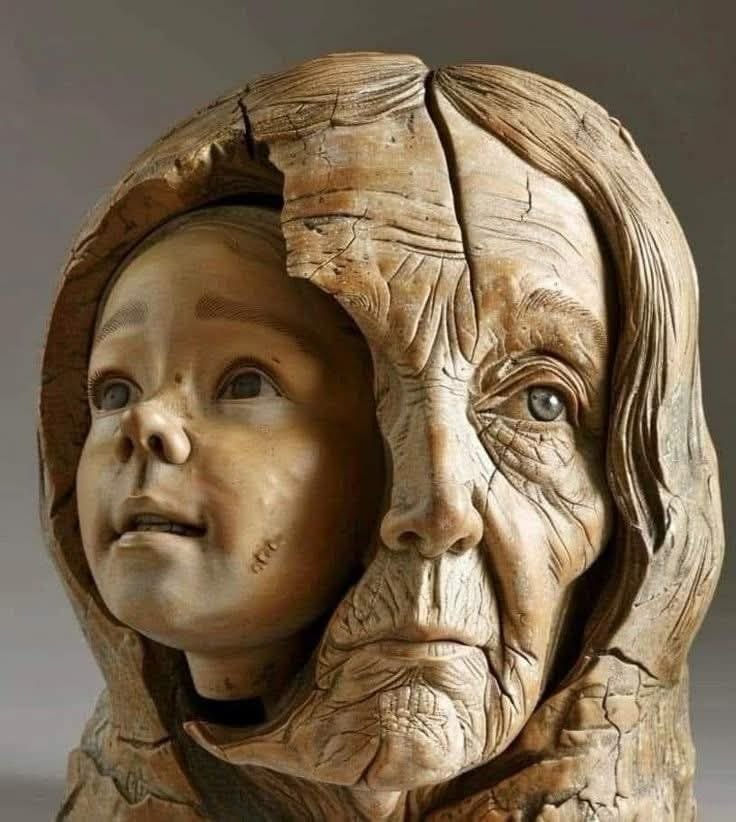Love Remembers What Memory Forgets | by Sara Viqar | Jul, 2025

As I peeked through the door, there she was…
Sitting on her bed, glasses resting on her nose, completely immersed in the newspaper.
So absorbed that she didn’t even notice someone had entered the room.
I tiptoed over and tickled her foot just enough to provoke that familiar response — a mix of irritation and affection. Usually, she wouldn’t even look up.
She’d just scoff and say, “Sara, stop behaving like a child. Grow up Now.”
That was our thing. A tiny ritual. A moment of mischief between a mother and daughter.
But that day…
That day, something was different….
She slowly looked up from the paper and stared at me. And in her eyes… I saw something I hadn’t seen before. There was something unfamiliar in her eyes…
The usual warmth was missing, replaced by a distant, lost expression that I had never seen before. Her face held the confusion of someone trying to place a stranger.
And then, after a long pause, that felt like eternity, she softly said,
“Oh, it’s you…”
I nodded with a smile, ready to settle into our usual routine, but as I was about to sit on the bed, she spoke again: “Okay, now that you’re here, please take me to my home. I don’t want to stay here anymore.”
I laughed in confusion. “ Ammi G, you’re already at your home. I just came to visit. Look, the kids are also here. They’ve been so eager to see you.”
She looked at me with a blank, almost childlike confusion. But when the kids ran in and hugged her, she lit up.
Soon she was her normal self again.
Although I could see it but I convinced myself that everything was fine. And I brushed it off as one of those “old age moments.”
But, what I didn’t realize was that this brief moment of confusion was just the first glimpse of what would become our new reality.
— — — — — — — — — — — — — — — — — — — — — — — — — — — — — — — — — — — — — —
A week or maybe 10 days later, as I was about to leave her place after dropping off groceries, she called me from her bedroom.
I rushed to the room and found her sitting on her prayer chair, looking towards the door like a curious child.
As I stood near her, she said softly without looking at me: “I want to read Zuhr prayers, but I can’t remember how we’re supposed to pray. Can you please help me?”
At first, I thought she was joking, because she has been regular with her prayers since she was 13. And now, at 70, how could she forget what has become her second nature.
But she had always been a serious person and wouldn’t ever make such jokes, so I sat down beside her and guided her through the prayers she had recited thousands of times throughout her life.
When we finished, she thanked me politely and dismissed me with a simple, “Okay, thank you. Now you may go.”
During my drive home, I couldn’t take my thoughts off this event. I couldn’t shake her image, that innocent, confused expression that seemed so foreign on a woman who had always been so certain, so strong.
But once again, I shrugged it off as age-related forgetfulness. After all, she seemed normal most of the time.
But I was wrong. That wasn’t aging — that was something else, silently and ruthlessly messing with her mind, memories, and mood….
Now, let me take you back in time and introduce you to the woman whose daughter I’m blessed to be.
My mother was a true powerhouse.
Her colleagues at the girls’ college where she worked as the principal called her the “Iron Lady,” and the title captured her perfectly. Standing tall with a commanding presence, she managed an institution of 5,000+ students and 40+ staff members with remarkable grace and authority. People could sense her strength from across a room.
She was fiercely independent, the kind of woman who would struggle alone rather than ask for help. Her pride wouldn’t allow her to appear vulnerable or dependent. She handled everything herself, often to the point of exhaustion, because asking for assistance felt like defeat to her.
This self-sufficiency wasn’t selfishness. She was always the first to offer help to others, ready to provide advice and support to family members and neighbors who sought her wisdom. People came to her because they recognized her strength. They knew she could silently carry not just her own burdens, but theirs as well.
She managed both her demanding career and her household responsibilities with grace and near perfection. She was our family’s foundation, the rock we all depended on.
What I didn’t realize, even after experiencing multiple events like the above-mentioned ones, is that dementia had already begun its silent invasion of her mind.
Those moments of confusion weren’t just random episodes; they were the first signs. And it progressed very quickly, even before we could understand what was happening.
Now, every visit feels like walking into a different version of her.
The woman who once commanded a college is now a shadow of her former self. Dementia came unannounced and stole the soul of my mother, leaving behind only a body that houses fragments of who she used to be.
One moment she seems sharp, recalling childhood stories, reading the newspaper, and correcting my kid’s grammar.
The next, she’s lost in a past that no longer exists.
She often asks for her mother, tells me to call her so she can help with the cooking.
She often forgets the names of her own offspring, thinks the home she and my father made with so much love as some strange place.
Now she loves to live in her past, frequently mixing up past and present.
And when I try to explain, she nods politely, but her eyes tell me… she doesn’t understand.
The cruelest irony is watching her try to hold onto routines that once defined her. She sits on her prayer chair, knowing she should pray but unable to remember how.
She insists on wearing the same clothes for days, forgetting that she once took pride in her appearance. She asks about meals she ate ten minutes ago, unable to retain even the most basic information.
Now, as I look at her, wrinkles on her face, her sagging skin, and drooping eyes are not what saddens me…. Seeing her lose her cognitive abilities one by one is what pains me the most.
This fragile, delicate old lady sitting on her bed cannot possibly be the same woman who once ran meetings with authority and confidence.
The hands that once comforted me now tremble and need to be held. The mind that once solved problems now struggles with the simplest tasks.
Losing a loved one is never easy, but losing them bit by bit, fragment by fragment, is soul-crushing in a way that sudden loss cannot match.
At least with sudden loss, you have the mercy of finality. With dementia, you live in a constant state of grief, mourning the person they were while trying to love the person they’re becoming.
Today she might remember everything; tomorrow she might ask me about my siblings- her own kids, like a stranger. Yesterday she could dress herself; today she needs help.
The woman who once refused help now depends on others, and the worst part is that sometimes she’s aware enough to be frustrated by her own limitations and dependence
That’s a grief that doesn’t end. Some days, you laugh at the things they say, and then you go into the other room to silently cry. Because your mind keeps rejecting reality, and you’re still clinging to a hope that they will recover.
It’s like watching a candle slowly burn down to nothing, while pretending it’s still bright enough to light the room.
Dementia doesn’t kill the body. It kills the soul, the spirit, the memories, and the personality. Leaving behind an innocent child trapped in the body of an older person.
If you know someone whose family is battling dementia, be kind to the caregivers. The mental exhaustion of watching a loved one deteriorate is overwhelming.
It’s not just about the practical challenges of care; it’s about the emotional toll of grieving someone who is still alive.
Today, when I hold my mother’s trembling hands, I remember the same hands that once combed my hair, cooked my favorite meals, and held my face when I cried.
Now she is the one who needs to be held. And I hold her even when she mixes me up with her sister. Even when she asks me to take her home… while already being in it.
Because love… love remembers what memory forgets.
My mother’s journey with dementia continues, and each day is different. However I’ve learned that even amid this chaos, there are moments of grace. Sometimes, when I least expect it, I catch a glimpse of the woman she used to be, a flash of her old grit, a moment of her former wisdom.
And these instances remind me that somewhere inside that confused, frightened mind, the Iron Lady still exists. She may be buried under layers of forgotten memories and lost connections, but she’s still there, still fighting in her own way. She still hasn’t given up.
So if you’re reading this, and you’re blessed to have your parents alive with you in good health. Hold your loved ones closer. Have those conversations you’ve been putting off. Make those memories while their minds can still hold them. Take pictures, record their voices, ask them about their lives and their stories. Give them your time and attention, because most of the time, things that we always take for granted go away in the blink of an eye.


